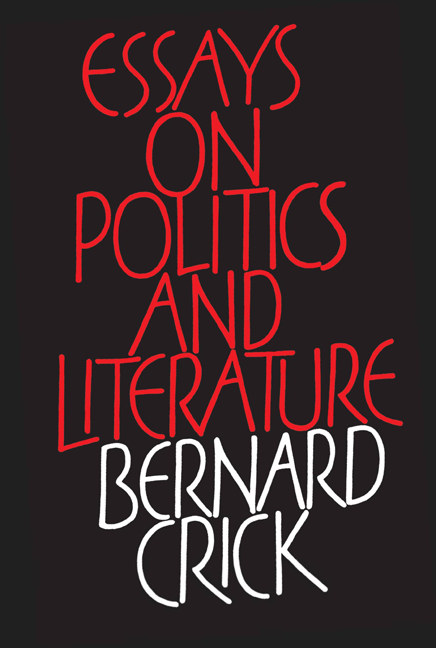Book contents
- Frontmatter
- Contents
- Preface
- Acknowledgements
- Foreword by David Daiches
- One Literature and Politics
- Two The Political in Britain’s Two National Theatres
- Three Young Writers of the Thirties
- Four Koestler’s Koestler
- Five Hannah Arendt: Hedgehog or Fox?
- Six Beatrice Webb as English Diarist
- Seven Words
- Eight My Lse
- Nine Reading The Observer as a Complex Text
- Ten On the Difficulties of Writing Biography and of Orwell’s in Particular
- Eleven Reading Nineteen Eighty-Four As Satire
- Twelve Animal Farm For Schools
- Thirteen Orwell and English Socialism
- Fourteen On the Orwell Trail
- Fifteen Wedekind’s Spring Awakening
- Sixteen Horvath’s Tales From the Vienna Woods
- Seventeen Pinter’s No Man's Land
- Eighteen Polly By Gaslight
- Nineteen Edgar Catches Jenkins’ Ear at the Barbican
- Twenty Barrault at the Barbican
- Index
Eleven - Reading Nineteen Eighty-Four As Satire
Published online by Cambridge University Press: 24 September 2020
- Frontmatter
- Contents
- Preface
- Acknowledgements
- Foreword by David Daiches
- One Literature and Politics
- Two The Political in Britain’s Two National Theatres
- Three Young Writers of the Thirties
- Four Koestler’s Koestler
- Five Hannah Arendt: Hedgehog or Fox?
- Six Beatrice Webb as English Diarist
- Seven Words
- Eight My Lse
- Nine Reading The Observer as a Complex Text
- Ten On the Difficulties of Writing Biography and of Orwell’s in Particular
- Eleven Reading Nineteen Eighty-Four As Satire
- Twelve Animal Farm For Schools
- Thirteen Orwell and English Socialism
- Fourteen On the Orwell Trail
- Fifteen Wedekind’s Spring Awakening
- Sixteen Horvath’s Tales From the Vienna Woods
- Seventeen Pinter’s No Man's Land
- Eighteen Polly By Gaslight
- Nineteen Edgar Catches Jenkins’ Ear at the Barbican
- Twenty Barrault at the Barbican
- Index
Summary
Nineteen Eighty-Four has been read with amazingly diverse interpretations. Serious people have seen it as a deterministic prophecy, as a conditional projection, as a humanistic satire of events, as nihilistic misanthrophy, as a libertian socialist satire of power in general, as predominantly an attack on the Soviet Union. At times the reader needs to be reminded that it is a novel and not a monograph or tract. Anthony Burgess has seen it as a comic novel. For a man who cultivated the skills and reputation of plain living, plain thinking and plain writing, this diversity of reception, this propensity to be body-snatched by nearly everyone (except the Communists), is at least curious.
Partly Orwell brought the trouble on himself. The book is indeed a novel, but specifically a satirical novel and it is also the most complex and ambitious work he ever undertook, probably too complex for its own good, both aesthetically considered (compared to Animal Farm, for instance) and in the crowded jostle of its substantive ideas. Orwell appeared to use satire and parody synonymously. In the now well-known press release he issued after reading the first reviews of Nineteen Eighty-Four, he denied that he was saying that ‘something like this will happen,’ but that ‘Allowing for the book being after all a parody, something like Nineteen Eight-Four could happen.’ And in his letter to an official of the United Automobile Workers, also worried at some of the American reviews, he says: T do not believe that the kind of society I describe necessarily will arrive, but I believe (allowing of course for the fact that the book is a satire) that something resembling it could arrive.’ In the same letter he called it a ‘show-up’ of the ‘perversions to which a centralised economy is liable and which have already been partly realised in Communism and Fascism.’ And in the letter to his publishers about the ‘blurb,’ he had said that he was ‘parodying… the intellectual implications of totalitarianism,’ which he then links, as in the press release, to the division of the world by the Great Powers; but in the press release he had added the specific dangers to freedom in having to rearm with the new atomic weapons. Strictly speaking, parody mocks a style or the external characteristics of a person,
- Type
- Chapter
- Information
- Essays on Politics and Literature , pp. 133 - 165Publisher: Edinburgh University PressPrint publication year: 2020

